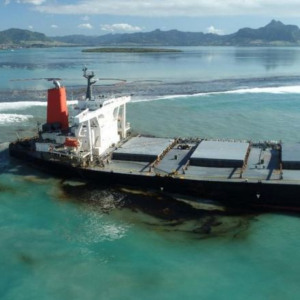
By Naseerah Nanabhai
3 September 2020
Black beaches, wrecked reefs, dead dolphins and sullied waters – the oil spill in Mauritius has caused lasting havoc for the island nation.
The spill was occurred when cargo ship MV Wakashio ran aground on a coral reef. This Japanese-owned vessel held 200 tonnes of diesel and 3,900 tonnes of fuel oil, an estimated 1,000 tonnes of which leaked into the sea when the ship’s hull cracked on 6 August. Leaving a 15-kilometre stretch of coastline — an internationally recognized biodiversity hotspot — smeared with oil.
Mauritius Response to the Spill
In dealing with the crisis, Mauritius received help from nearby Reunion to erect ocean booms — floating structures that contain the spill. Teams from the United Nations were also deployed to coordinate clean-up efforts.
Many of the locals also helped by creating make-shift ocean booms to contain the oil. Empty bottles were put in the middle of the booms to make them float, and anchors were attached to keep them from drifting away with the current.
People worked day and night to contain as much oil as possible so that it wouldn’t reach the shoreline, where it is more difficult to clean. Almost 75% of the spilt oil was contained and removed, with only a small amount reaching the shore.
Who will pay
So far, Mauritius has requested that Japan pay $34 million in order to support local fishermen whose livelihoods were adversely impacted by an oil leak last month, according to a Mauritian government document accessed by Japanese news agency Kyodo News.
According to the Japanese agency, an official from the Embassy of Japan in Mauritius confirmed that various requests had been received. The official said, “It is true that we are currently receiving various requests. Japan is working to promptly do all that it can.”
With the crisis still ongoing, experts say it is impossible to predict how much money Mauritius will eventually be able to claim in compensation.
Can future spills be avoided
In 1990, Mauritius was one of the first African countries to finalize an oil spill contingency plan with support from the International Maritime Organization and the UN Environment Programme.
There is the additional complication that Mauritius lies on a very busy shipping lane – particularly for fuel. As a result, Mauritius was not only aware of the risk and had elaborated planning tools, authorities also had experience with incidents of this kind.
The Mauritius oil spill tells us what can happen even if you are well-prepared. Planning does not always go as intended. Capacity building and training have their limits.







0 Comments